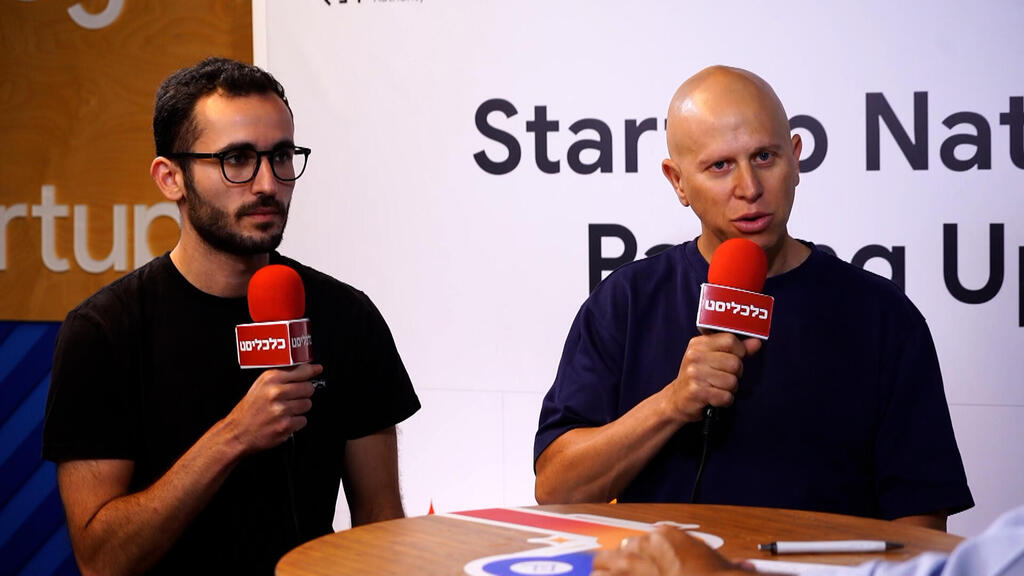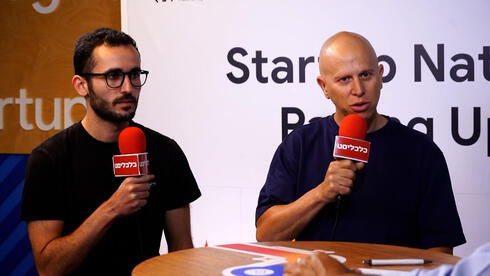
"Anyone can now create fully functioning applications and that's a real revolution"
Amitay Gilboa, CEO of spring.new, was speaking on a panel with Yuval Passov, Head of Google for Startups, Emerging Markets, as part of Google's Startup Week in collaboration with Calcalist.
"The revolution happening today is that anyone can build software. Vibe Coding is a term that entered our world a few months ago, when tools emerged that allow people to build applications, websites, and software - using natural, conversational language," said Amitay Gilboa, CEO of spring.new, on a panel with Yuval Passov, Head of Google for Startups, Emerging Markets. The session, moderated by Elihay Vidal, Editor-in-Chief of CTech, was part of Google's Startup Week in collaboration with Calcalist.
"These tools enable anyone - whether they have a technical background or have never written a line of code - to create fully functioning applications in natural language. What’s changed is that until now, you needed a technical background and had to study programming, which is notoriously difficult. Today, that barrier is coming down."
Did you have any experience writing software before?
"I had very, very little experience writing software. My partner Shmuel is a legendary programmer. What happened in our process is that, with the help of our product, we actually developed our product together. I became a programmer at the company, even though I wouldn’t have been able to do it without the capabilities of vibe coding and Spring."
So you actually write vibe code using vibe coding to build something that itself enables vibe coding?
"Exactly. It’s a self-reinforcing cycle. I go into Spring, write something we want to build - say, a component in our interface - and then I give the resulting code to Shmuel, who integrates it into the product. In a sense, the platform develops itself."
Yuval, where does Google come into the picture when it comes to startups - especially now with the rise of AI startups?
"First of all, we’re here on campus, and we’ve been a home for startups in Israel for 12 years. Thousands of startups have come through. We offer entrepreneurs access to mentors from Google, from around the world, across technology, best practices, and business connections. Ultimately, we want this to be a launchpad for them."
Have you seen changes over the years in the types of startups or entrepreneurs coming through, maybe a shift from large to smaller ventures?
"Definitely, especially in recent months. In the past, many startups came in having raised significant funding. Today, we’re seeing hundreds of individual entrepreneurs. Often, their strength lies in not coming from tech, but from the domain of the problem itself. For example, a lawyer, doctor, or nurse who understands the real problem, knows how to ask the right questions, and can design a solution. Technology is now accessible to everyone. The real differentiator is who asks the right questions."
Related articles:
Amitay, how do you address the issue of code quality? When a human writes code, you know what to expect. But when AI generates it, you don’t always know what you're going to get.
"We let AI do what it does best, and for the parts it doesn’t handle well, we give it a structured framework we built in advance. For example, we pre-built the integrations so the AI can access them. But for things like front-end development, AI is incredibly strong."
Vibe coding might be good enough to build a minimum viable product quickly, but Yuval, is that enough to satisfy investors?
"I don’t think so, not entirely. It’s enough to demonstrate feasibility, but when it comes time to scale to millions of users, vibe coding likely won’t hold up. That’s when things can fall apart. You still need developers and technical professionals who can manage the system and solve complex issues. In fact, we’re hearing more and more from industry voices that junior developers are evolving into agents, they’re the ones building and iterating using these tools."
Amitay, you're essentially running a solo startup. Are you seeing more companies taking this path?
Yuval: "Absolutely. We’re seeing more and more startups founded by a single entrepreneur who starts at a very basic level and begins building. Everyone now has access to the technology, but what sets one entrepreneur apart from another comes down to three things:
- Domain expertise – deeply understanding a problem space and knowing how to streamline or improve it.
- Data – having access to proprietary or unique datasets, like those in a law firm or clinic.
- Community and support – this is where Google for Startups comes in. Entrepreneurs often feel alone. We provide a community of peers and mentors to help guide them through the journey.
Those three factors—expertise, data, and support—create a real edge for solo entrepreneurs."
Amitay "I think the term ‘solo entrepreneur’ can be misleading. You still need a lot of people supporting you, even if they’re not officially part of your team. We’ve had incredible support from the Google for Startups team. When we launched, they helped promote us on LinkedIn. When we ran into technical issues, they were quick to jump in. You absolutely need partners on the journey, even if they’re not full-time employees."
How does Gemini help you in your development work?
Amitay: "Gemini helps us in two key ways. First, in our back-office work - market research, business model planning, and strategic thinking - we consult with Gemini directly within Google’s product suite. It helps us better understand how to build the company.
"Second, our agent, the one that users interact with on Spring, is powered by Gemini. When you talk to Spring, you’re essentially talking to Gemini. So we use it both as business users and as tech integrators embedding it into our product."
What can startups do with Gemini today?
Yuval: "I just showed this earlier, I took a piece of paper, sketched an app, took a photo, uploaded it to AI Studio, and within a minute and a half, I had a working app.
"It’s a wild time for entrepreneurs. If anyone out there wants to join us, check out our website and reach out directly. We’re always welcoming new founders."
